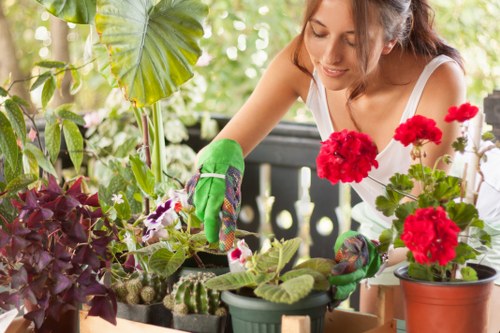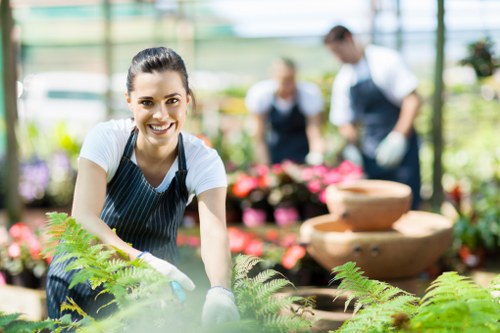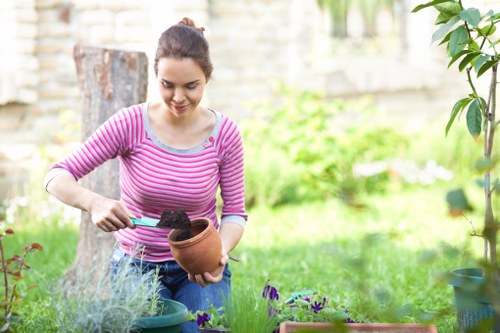Ultimate Guide to Garden Fencing Hooks

When it comes to enhancing the beauty and functionality of your garden, one often overlooked element is the garden fencing hook. These simple yet effective tools play a crucial role in maintaining your garden’s structure, ensuring both aesthetics and practicality. Whether you’re a seasoned gardener or just starting, understanding the importance of garden fencing hooks can make a significant difference in your outdoor space.
Garden fencing hooks come in various shapes, sizes, and materials, each designed to serve specific purposes. From securing fencing panels to attaching decorative elements, these hooks are essential for creating a cohesive and well-maintained garden environment. In this guide, we will explore the different types of garden fencing hooks, their uses, installation tips, and maintenance practices to help you make informed decisions for your garden.
Before diving into the details, it’s important to understand the basics of garden fencing. A sturdy fence not only defines the boundaries of your garden but also provides protection against pests and intruders. The right fencing system can add to the overall appeal of your garden, making it a pleasant and safe space for relaxation and activities. However, without the proper hooks and hardware, even the best fencing can become unstable and unattractive over time.

Types of Garden Fencing Hooks
There are several types of garden fencing hooks available, each suited for different fencing materials and applications. Understanding the various options can help you choose the best hooks for your specific needs.
- Metal Hooks: Durable and weather-resistant, metal hooks are ideal for heavy-duty fencing systems. They provide strong support and are suitable for both wooden and metal fences.
- Plastic Hooks: Lightweight and easy to install, plastic hooks are perfect for temporary or lightweight fencing. They are also resistant to rust and corrosion.
- Adjustable Hooks: These hooks offer flexibility in terms of height and positioning, making them versatile for different fencing configurations.
- Decorative Hooks: Combining functionality with aesthetics, decorative hooks add a stylish touch to your garden fencing while serving their practical purpose.
Choosing the right type of hook depends on the material of your fence, the climate in your area, and the specific requirements of your garden setup. For instance, metal hooks are better suited for areas with heavy winds or where additional support is needed, while plastic hooks work well in mild climates and for less demanding applications.

Materials Used in Garden Fencing Hooks
The material of the fencing hook plays a significant role in its durability and suitability for your garden. Here are the common materials used:
- Stainless Steel: Known for its exceptional resistance to rust and corrosion, stainless steel hooks are ideal for outdoor use, especially in regions with high humidity or rainfall.
- Galvanized Steel: Coated with a layer of zinc, galvanized steel hooks offer good protection against rust and are more affordable than stainless steel.
- Aluminum: Lightweight and resistant to corrosion, aluminum hooks are easy to handle and install, making them a popular choice for DIY projects.
- Brass: Brass hooks are not only durable but also add an elegant touch to your garden fencing. They are resistant to corrosion and can complement various garden styles.
- Plastic: As mentioned earlier, plastic hooks are lightweight and versatile. They are suitable for temporary installations and areas with minimal exposure to harsh weather conditions.
When selecting a material, consider the environmental factors of your garden, such as exposure to moisture, sunlight, and temperature fluctuations. This will ensure that your fencing hooks remain functional and visually appealing for years to come.

Installation Tips for Garden Fencing Hooks
Proper installation is crucial for the longevity and effectiveness of your garden fencing hooks. Here are some tips to ensure a successful installation:
- Choose the Right Location: Determine where the hooks will provide the most support. Typically, hooks are placed at corners, along the top and bottom of the fence, and at regular intervals for added stability.
- Prepare the Surface: Ensure that the area where the hook will be installed is clean and free from debris. This will help the hook adhere properly and prevent any movement.
- Use the Appropriate Tools: Depending on the type of hook and fencing material, you may need specific tools such as drills, screws, or nails. Follow the manufacturer’s instructions for the best results.
- Secure the Hooks Firmly: Make sure the hooks are tightly secured to the fence. Loose hooks can lead to sagging or collapse over time.
- Check Alignment: Ensure that all hooks are aligned properly to maintain a uniform appearance and structural integrity of the fence.
Taking the time to install your garden fencing hooks correctly will save you from future repairs and maintenance, ensuring your fence remains sturdy and attractive.

Maintenance of Garden Fencing Hooks
Regular maintenance is essential to keep your garden fencing hooks in optimal condition. Here are some maintenance tips:
- Inspect Regularly: Periodically check the hooks for any signs of wear, rust, or damage. Early detection can prevent minor issues from becoming major problems.
- Clean the Hooks: Remove dirt and debris from the hooks to maintain their appearance and functionality. Use a mild detergent and water for cleaning, especially for metal hooks.
- Apply Protective Coatings: For metal hooks, applying a protective coating such as paint or a rust-resistant spray can extend their lifespan.
- Tighten Loose Screws or Bolts: Over time, screws and bolts may loosen due to weather conditions and usage. Ensure they are tight to maintain the stability of your fence.
- Replace Damaged Hooks: If a hook is severely damaged or corroded, replace it promptly to prevent compromising the entire fencing system.
Consistent maintenance not only prolongs the life of your garden fencing hooks but also enhances the overall appearance and safety of your garden.
Benefits of Using Garden Fencing Hooks
Investing in high-quality garden fencing hooks offers numerous benefits:
- Enhanced Durability: Proper hooks provide stable support, preventing sagging and extending the life of your fence.
- Improved Aesthetics: Well-installed hooks contribute to a neat and organized appearance, enhancing the overall look of your garden.
- Easy Installation: Modern fencing hooks are designed for easy installation, making DIY projects more manageable.
- Versatility: Available in various materials and styles, fencing hooks can be tailored to match your garden’s specific needs and design.
- Cost-Effective: Durable hooks reduce the need for frequent replacements and repairs, saving you money in the long run.
These benefits make garden fencing hooks a valuable addition to any garden, ensuring both functionality and beauty.
Choosing the Right Garden Fencing Hook for Your Needs
Selecting the appropriate fencing hook involves considering several factors:
- Fence Material: Ensure the hook is compatible with your fence material, whether it’s wood, metal, vinyl, or another type.
- Climate: Choose hooks made from materials that can withstand your local weather conditions, such as stainless steel for humid areas.
- Weight Capacity: Consider the weight of the fencing panels and choose hooks that can support the load without bending or breaking.
- Design Preferences: Select hooks that complement the style of your garden and fencing, whether you prefer a rustic, modern, or ornamental look.
- Installation Requirements: Some hooks may require specific tools or mounting methods, so choose ones that fit your skill level and available resources.
Taking these factors into account will help you select the most suitable fencing hooks, ensuring a secure and attractive garden fence.
Innovative Garden Fencing Hook Designs
With advancements in garden design, fencing hooks have also evolved to offer more functionality and style. Here are some innovative designs:
- Quick-Release Hooks: These hooks allow for easy removal and reattachment of fencing panels, ideal for temporary installations or areas where the fence needs to be moved periodically.
- Dual-Purpose Hooks: Combining a hook with another function, such as a planter or decorative element, these hooks add extra value and appeal to your garden.
- Adjustable Height Hooks: These hooks offer flexibility in adjusting the height of the fence, accommodating changes in garden layout or personal preferences.
- Camouflage Hooks: Designed to blend seamlessly with natural elements, camouflage hooks maintain the aesthetic integrity of your garden while providing the necessary support.
- Smart Hooks: Incorporating technology, smart hooks can include features like sensors for monitoring fence stability or integrated lighting systems for enhanced visibility.
These innovative designs cater to diverse gardening needs and preferences, making garden fencing hooks more versatile and functional than ever before.
Local Expertise: Garden Fencing Hooks in Hook and Surrounding Areas
If you’re located near Hook, you’re in luck! The area boasts a variety of local suppliers and experts specializing in garden fencing hooks. Here are some of the closest areas to Hook that offer excellent options for your fencing needs:
- Chertsey: Just a short drive from Hook, Chertsey offers a range of garden supply stores where you can find quality fencing hooks and get professional advice.
- Wickford: Known for its extensive garden centers, Wickford provides a wide selection of fencing hooks in different materials and styles.
- Virginia Water: With its lush gardens, Virginia Water is home to specialty shops that cater to high-end fencing hook requirements.
- Byfleet: Byfleet's local hardware stores stock a variety of fencing hooks suitable for various garden styles and budgets.
- Englefield Green: Englefield Green offers both retail and online options for purchasing fencing hooks, ensuring convenience and accessibility.
- Longcross: Longcross's garden supply outlets provide a diverse range of fencing hooks, including eco-friendly and sustainable options.
- Woking: With numerous home improvement stores, Woking is a great place to explore different fencing hook solutions.
- Frimley: Frimley offers personalized service from local experts who can help you choose and install the perfect fencing hooks for your garden.
- Staines-upon-Thames: Staines boasts several suppliers that specialize in garden fencing hardware, including hooks and other essential components.
- Sunbury-on-Thames: Sunbury provides a variety of fencing hook options through its well-stocked garden centers.
- West Byfleet: West Byfleet's local markets feature vendors that offer a range of fencing hooks, from basic to decorative designs.
- Molesey: Molesey's garden stores are known for their high-quality fencing hardware, including durable and stylish hooks.
- Weybridge: Weybridge offers both traditional and modern fencing hook options to suit any garden aesthetic.
- Virginia: Close to Hook, Virginia has specialized suppliers that offer bespoke fencing hooks tailored to unique garden requirements.
- Tadworth: Tadworth's home improvement centers provide a comprehensive selection of fencing hooks for all types of gardens.
- Oxshott: Oxshott is home to premium fencing hook suppliers, perfect for those looking to invest in top-quality garden fencing solutions.
These nearby areas offer a plethora of options to ensure you find the perfect garden fencing hooks to suit your needs, preferences, and budget. Leveraging local expertise can also provide you with valuable insights and support throughout your fencing project.
DIY vs. Professional Installation
Deciding between a DIY approach and hiring a professional for installing garden fencing hooks depends on several factors:
- Skill Level: If you’re comfortable with basic tools and have some DIY experience, installing fencing hooks yourself can be a rewarding project.
- Time Commitment: DIY installations may take longer, especially if you’re new to fencing projects. Professionals can usually complete the job more efficiently.
- Cost: While DIY can save on labor costs, hiring a professional ensures the job is done correctly, potentially saving money on future repairs.
- Customization: Professionals can offer tailored solutions and may have access to specialized hooks and materials that aren’t readily available to DIY enthusiasts.
- Tools and Equipment: Installing fencing hooks may require specific tools. If you don’t have the necessary equipment, DIY might become more challenging.
Ultimately, the choice between DIY and professional installation depends on your comfort level, budget, and the specific needs of your garden fencing project. Both options have their advantages, and weighing them can help you make the best decision for your situation.
Eco-Friendly Garden Fencing Hooks
As sustainability becomes increasingly important, eco-friendly garden fencing hooks are gaining popularity. These hooks are designed to minimize environmental impact without compromising on functionality:
- Recycled Materials: Hooks made from recycled metals or plastics reduce waste and promote the use of sustainable resources.
- Biodegradable Options: Some hooks are crafted from biodegradable materials, ensuring they break down naturally without harming the environment.
- Non-Toxic Coatings: Eco-friendly hooks often feature non-toxic coatings that are safe for plants and wildlife, making them ideal for organic gardens.
- Durable Designs: By using sustainable materials that last longer, these hooks reduce the need for frequent replacements, lowering overall environmental impact.
- Local Production: Purchasing hooks from local manufacturers supports sustainable practices and reduces the carbon footprint associated with transportation.
Choosing eco-friendly garden fencing hooks is a responsible way to maintain your garden while contributing to environmental conservation. These sustainable options align with the values of environmentally conscious gardeners.
Cost Considerations for Garden Fencing Hooks
Budgeting for garden fencing hooks involves understanding the different cost factors:
- Material: The type of material significantly affects the price. Stainless steel hooks are generally more expensive than plastic or galvanized steel options.
- Quantity: Purchasing in bulk often leads to cost savings, especially for large fencing projects.
- Design and Features: Hooks with additional features or decorative elements may cost more than basic models.
- Brand: Reputable brands might charge a premium for quality assurance and customer support, but investing in a reliable brand can be cost-effective in the long run.
- Installation Costs: If you opt for professional installation, factor in the labor costs when budgeting for your fencing project.
By considering these factors, you can find garden fencing hooks that fit your budget without compromising on quality and functionality.
Common Mistakes to Avoid
When selecting and installing garden fencing hooks, certain mistakes can compromise the integrity and appearance of your fence:
- Using Inappropriate Materials: Selecting hooks that are not compatible with your fence material or climate can lead to quick deterioration and failure.
- Improper Installation: Failing to install hooks correctly can result in unstable fencing, causing safety hazards and aesthetic issues.
- Overlooking Weight Capacity: Choosing hooks that cannot support the weight of your fence panels can lead to sagging and collapse.
- Neglecting Maintenance: Skipping regular inspections and maintenance can allow minor problems to escalate, requiring costly repairs.
- Ignoring Local Regulations: Some areas have specific guidelines for fencing installations. Ignoring these can result in fines or the need to redo your fence.
- Poor Planning: Failing to plan the layout and placement of hooks can lead to uneven fencing and structural weaknesses.
By being aware of these common mistakes, you can ensure a successful garden fencing project that stands the test of time.
Enhancing Garden Privacy with Fencing Hooks
Garden fencing hooks can be instrumental in creating a private and secluded outdoor space:
- Securing Privacy Screens: Hooks can hold up privacy screens or panels, blocking unwanted views and creating a peaceful environment.
- Attaching Plant Trellises: Using hooks to secure trellises allows climbing plants to grow, adding natural privacy barriers and enhancing the aesthetic appeal.
- Installing Curtains or Blinds: For pergolas or shaded areas, hooks can be used to hang curtains or blinds, providing adjustable privacy as needed.
- Adding Decorative Fencing Elements: Hooks can support decorative latticework or ornamental panels, contributing to both privacy and garden beauty.
By strategically placing garden fencing hooks, you can effectively enhance the privacy of your garden, making it a more inviting and comfortable space for relaxation and gatherings.
Integrating Fencing Hooks with Garden Decor
Garden fencing hooks offer opportunities to incorporate various decorative elements into your outdoor space:
- Hanging Lights: Use hooks to suspend string lights or lanterns, adding warmth and ambiance to your garden in the evenings.
- Display Artwork: Hooks can hold garden art pieces, such as metal sculptures or decorative plates, enhancing the visual interest of your fence.
- Bird Feeders and Houses: Attach hooks to create inviting spots for birds, contributing to the biodiversity and liveliness of your garden.
- Hanging Planters: Utilize hooks to suspend planters, allowing you to add more greenery without taking up valuable ground space.
- Wind Chimes: Secure hooks to hang wind chimes, bringing soothing sounds and a touch of elegance to your outdoor area.
Integrating decorative items with fencing hooks not only enhances the functionality of your garden but also adds a personalized and charming touch to your outdoor living space.
Choosing the Right Size and Shape
Selecting the appropriate size and shape of garden fencing hooks is crucial for both functionality and appearance:
- Size: The size of the hook should match the weight and type of the fence panel. Larger, heavier hooks are necessary for robust fencing, while smaller hooks suffice for lightweight materials.
- Shape: The shape of the hook can affect how it interacts with the fence. Curved hooks may provide better support for certain applications, while straight hooks offer simplicity and ease of use.
- Style: Choose a style that complements your garden’s design. For example, ornate hooks may suit a traditional garden, while sleek, minimalist hooks are better for modern landscapes.
By carefully considering the size and shape, you ensure that the hooks not only perform their intended function but also enhance the overall look of your garden fencing.
Safety Considerations
Ensuring safety when installing and using garden fencing hooks is paramount:
- Secure Mounting: Make sure hooks are firmly attached to the fence to prevent them from coming loose and causing accidents.
- Weight Limits: Adhere to the manufacturer’s guidelines regarding the weight capacity of each hook to avoid overloading and potential failure.
- Sharp Edges: Choose hooks with smooth edges or cover any sharp points to prevent injuries, especially in areas accessed by children or pets.
- Proper Placement: Install hooks at positions that do not interfere with the walkways or create tripping hazards.
- Regular Inspections: Periodically check hooks for signs of wear or damage, replacing them as necessary to maintain safety.
By prioritizing safety, you ensure that your garden remains a secure and enjoyable space for everyone.
Conclusion
Garden fencing hooks are indispensable tools for creating and maintaining a beautiful, functional, and secure garden space. From selecting the right type and material to proper installation and maintenance, every aspect plays a role in ensuring your fence stands the test of time.
By understanding the various options available and considering factors such as climate, fence material, and aesthetic preferences, you can choose the perfect fencing hooks that meet your specific needs. Additionally, leveraging local expertise and staying mindful of safety and environmental considerations will further enhance the effectiveness and sustainability of your garden fencing.
Whether you opt for a DIY approach or seek professional assistance, investing time and effort into selecting and installing quality garden fencing hooks will pay off in the long run, providing a sturdy and attractive boundary for your beloved garden.
Frequently Asked Questions
1. What are the best materials for garden fencing hooks?
The best materials for garden fencing hooks depend on your specific needs and environmental conditions. Stainless steel and galvanized steel hooks are highly durable and resistant to rust, making them excellent choices for most outdoor settings. Aluminum hooks are lightweight and resistant to corrosion, ideal for temporary installations or areas with mild weather. Brass hooks add an elegant touch and are also resistant to corrosion, suitable for decorative purposes.
2. How do I install garden fencing hooks securely?
To install garden fencing hooks securely, first choose the appropriate location on your fence. Clean the surface where the hook will be mounted to ensure proper adhesion. Use the correct tools, such as drills and screws, as per the manufacturer’s instructions. Ensure that the hooks are tightly fastened and check for alignment to maintain a uniform appearance. It’s also advisable to use hooks that match the weight capacity of your fence panels to prevent sagging or collapse.
3. Can I use garden fencing hooks for both privacy and decoration?
Yes, garden fencing hooks are versatile and can be used for both privacy and decoration. They can secure privacy screens, trellises, curtains, or decorative elements such as lights and planters. This dual functionality allows you to enhance the functionality and aesthetics of your garden simultaneously.
4. How do I maintain my garden fencing hooks?
Maintaining garden fencing hooks involves regular inspections for signs of wear, rust, or damage. Clean the hooks periodically to remove dirt and debris, using mild detergent and water for metal hooks. Apply protective coatings, such as paint or rust-resistant sprays, to metal hooks to extend their lifespan. Tighten any loose screws or bolts and replace any damaged hooks promptly to ensure the ongoing stability and appearance of your fence.
5. Are there eco-friendly options available for garden fencing hooks?
Yes, there are eco-friendly garden fencing hooks available made from recycled materials or biodegradable substances. These hooks minimize environmental impact while still providing the necessary functionality. Additionally, choosing hooks with non-toxic coatings and those produced locally can further enhance their eco-friendliness.